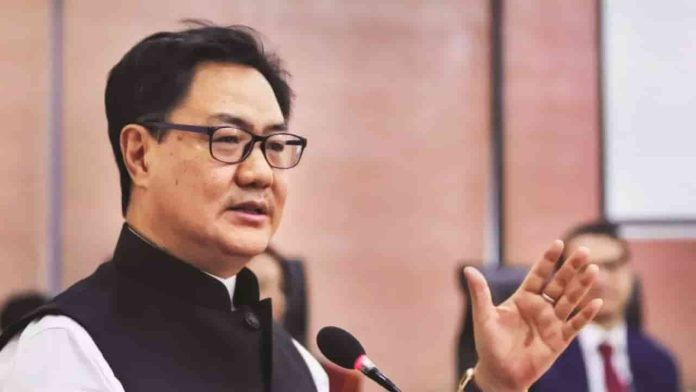Recently, the standoff and bitterness between the government and the judiciary worsened when Union Law Minister Kiren Rijiju made a scathing comment about the functioning of the Supreme Court collegium. Holding that the collegium system was alien to the Indian Constitution, he questioned the opacity of its functioning.
Rijiju said that judges spend half their time behind the closed door of collegiums deciding on judges’ names to be appointed, while the work of dispensing justice remains pending. People witness political leaders’ politics, while judges’ power-play is hidden behind the closed doors of the collegium, he added. Rijiju went on to say that nowhere in the world did judges appoint judges as in India.
These were strong words and the judiciary was quick to respond. During a hearing, Supreme Court judge Justice Sanjay Kishan Kaul remarked: “Judges names are not being cleared for appointment by the government. How will the system work? We have expressed our anguish. It appears that the government is not happy that the National Judicial Appointments Committee (NJAC) couldn’t be institutionalised. Can that be the reason for not clearing the names?”
Even the Bar has been supportive of the collegium system At the farewell function of Chief Justice UU Lalit, Pradeep Rai, vice president of the Supreme Court Bar Association, said: “The collegium system is working absolutely fine. If there is any suggestion where the collegium system can work without any influence or interference from the government, we will definitely work on it.” As per a newspaper report on Constitution Day celebrations, Rai had requested the law minister to accept the collegium’s recommendations. “This issue has been settled by the pronouncements of this Court. If the government has any doubt, I would advise you to consult the judgments of the Supreme Court,” he said.
Rai added that Rijiju, being the seniormost person in the law ministry, should not make statements that can embarrass anyone. “The honourable judges don’t have a medium to say anything, but the Bar will certainly respond to it,” said Rai.
In a related development, 20 names suggested by the collegium as judges were returned by the government. Of these, 11 were new names, while nine had been sent back earlier and were resent again by the collegium.
In recent times, the government’s stand on the judiciary’s functioning has perceptibly hardened. Rijiju had made his famous “lakshman rekha” remark where he had said the judiciary should not cross the limits and step on executive toes. The judiciary, on its part, has maintained that the collegium system is perfect and that judicial overreach happens in case of executive underreach where the government fails to fulfil its constitutional obligations.
Incidentally, Justice Kaul’s remark relates to the aborted effort of the NDA government in 2014 to pass the NJAC Act in Parliament with the 99th Constitution Amendment. The Commission was to comprise of the chief justice of India (CJI), two Supreme Court judges “next in seniority to the CJI”, the Union law minister and two eminent jurists.
Along with the Constitution Amendment Act, the NJAC Act, 2014, was also passed by Parliament to regulate its functions. However, in a historical move on October 16, 2015, a Constitution bench of the Supreme Court by a 4:1 majority upheld the collegium system and struck down the NJAC as unconstitutional.
The collegium system has evolved on the basis of a series of Supreme Court judgments, now famously known as the “Judges Cases”. If the “First Judges Case” of 1981 gave the government primacy in judicial appointments, then the “Second Judges Case” in 1993 overturned this decision and introduced the collegium system, holding that “consultation” with the government required “concurrence”. In 1998, in the “Third Judges Case”, the Court ruled that the collegium would be a five-member body. This led to the formation of the current collegium system, wherein the CJI and four seniormost judges deliberate appointments, promotions and transfers of judges.
To smoothen the judiciary-government interplay, a Memorandum of Procedure (MoP) was evolved after the “Third Judges Case”. The MoP was first drawn up in 1999. It was reworked in 2016 following the Supreme Court’s decision to strike down the NJAC.
It is interesting to note that the timeline for judges’ appointment is precisely mentioned in the MoP. It says: The Intelligence Bureau (IB) should submit its report within 4 to 6 weeks to the government. The central government shall forward the recommendations to the Supreme Court within 8 to 12 weeks. In case the government has reservation on any name, it can send the recommendation back to the collegium. If the collegium reiterates the proposal, the appointment should be made within 3 to 4 weeks.
If this timeline is followed, there would be no schisms. As the MoP doesn’t have a statutory sanction, its norms are freely flouted. It’s time that the MoP is formalised as a law, so that both parties follow deadlines in appointment matters.
As for the collegium system, though there exists a reason to firewall the appointment process, a certain degree of transparency and objectivity should be welcomed by the judiciary.
—By Sanjay Raman Sinha


